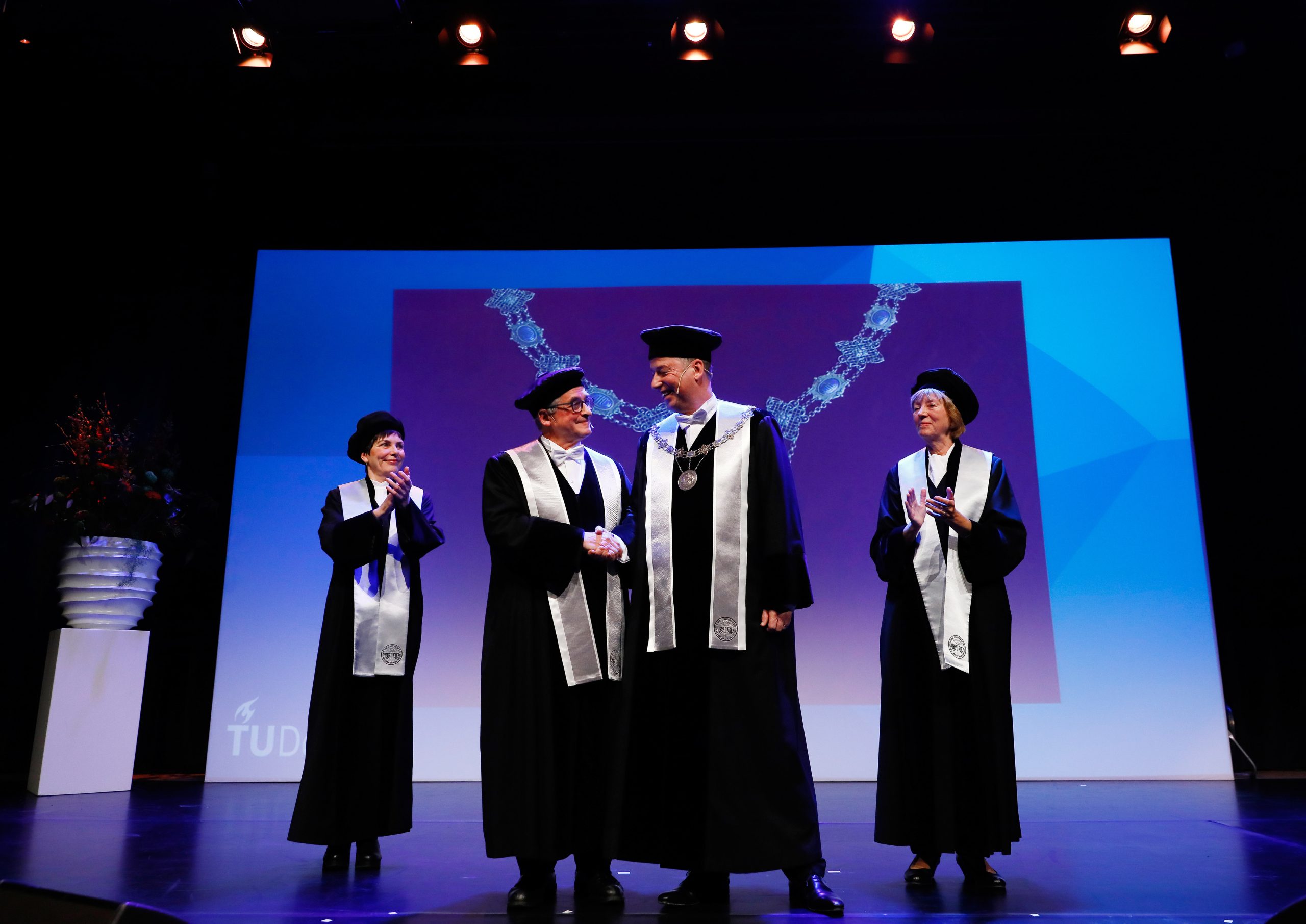The festive gathering in the auditorium for the university’s 176th birthday had two major themes. One, Rector Magnificus Karel Luyben transferred the rectorship to Tim van der Hagen. Two, the university openly committed itself to open science and open data.
Transfer of the rectorship from Karel Luyben (left) to Tim van der Hagen. (Photo: Roy Borghouts)
 New rector Professor Tim van der Hagen. (Photo: Roy Borghouts)
New rector Professor Tim van der Hagen. (Photo: Roy Borghouts)Freshly installed as Rector Magnificus and President of TU Delft, Professor Tim van der Hagen presented the TU Delft Strategy Framework, a strategy plan for the next six years. Its theme is ‘impact for a better society’. Some of its policy aspects will be: better integration of education and research; less distinction between scientific and support staff; strengthening the ties with alumni for mutual benefit; and, more free zones on campus for new ideas. Van der Hagen developed the strategy plan after consultation with around 600 members of the TU Delft community.
Jeroen van der Veer, as President of the TU Delft advisory board, explained the new structure of the executive board. Combining the rectorship with the chairman of the board has created one voice representing the TU instead of two, as was the case previously. The complexity and sheer size of the university’s real estate justified the installation of a vice-president of operations (Nicole Vermeulen). The other vice-presidency is committed to education (talks ongoing).
 Professor Karel Luyben during his last speech as university rector. (Photo: Roy Borghouts)
Professor Karel Luyben during his last speech as university rector. (Photo: Roy Borghouts)The second major item, and this year’s university theme, is Open Science. This move promotes the free availability of scientific publications and data. The departing rector Professor Karel Luyben, is known as a fervent advocate of open science and open data, both in the national and in the European arena. He gave a short motivational speech for his dedicated support of open science. His points were that open science makes science more reliable, credible, and effective in facing societal challenges because anyone can use the data and the analyses.
 Professor Jean Claude Burgelman. (Photo: Roy Borghouts)
Professor Jean Claude Burgelman. (Photo: Roy Borghouts)Keynote speaker Professor Jean Claude Burgelman (DG Research) supported Luyben’s position by saying that open science is a paradigm shift that Europe cannot afford to miss. Open science will change everything, he said. It will change the way researchers work; how they share their data; how they get their funding; and how they publish their results. Europe has a tendency to underplay such game-changers, said Burgelman. But in open science, Europe should not make this mistake, and it should take the lead instead.
 Professor Geert-Jan Houben. (Photo: Roy Borghouts)
Professor Geert-Jan Houben. (Photo: Roy Borghouts)Data specialist, Professor Geert-Jan Houben, specified the obligations that open science demands from scientists. They will have to know how to store and handle their data in the context of open science. Plus, they will have to communicate clearly and openly on the conclusion the can be drawn from their data, and what their data handling systems do.
 TU Library Director Wilma van Wezenbeek (Photo: Roy Borghouts)
TU Library Director Wilma van Wezenbeek (Photo: Roy Borghouts)TU Library director, Wilma van Wezenbeek, wrapped-up the open science symposium earlier in the day. Some 200 participants from research, publishing, and government had discussed the practicalities of open science, such as the need for proper data management for sharing and opening up the peer review process. One participant remarked: ‘Open science is science done right.’ Van Weezenbeek created her own motivational line: ‘Science is great. Open it up.’
Guests of honour at the Dies Natalis were the Dutch Minister of Education, Culture, and Science, Ingrid van Engelshoven, and the Mayor of Delft Maja van Bijsterveld.
 Veejay performance at the Dies (Photo: Roy Borghouts)
Veejay performance at the Dies (Photo: Roy Borghouts)The interludes were performed by the Rosenberg Trio (smooth and swinging string jazz), and by Veejay (live dance accompanying music video projection). The attendees – around 700 of them – applauded them loud and long.
Do you have a question or comment about this article?
j.w.wassink@tudelft.nl


Comments are closed.